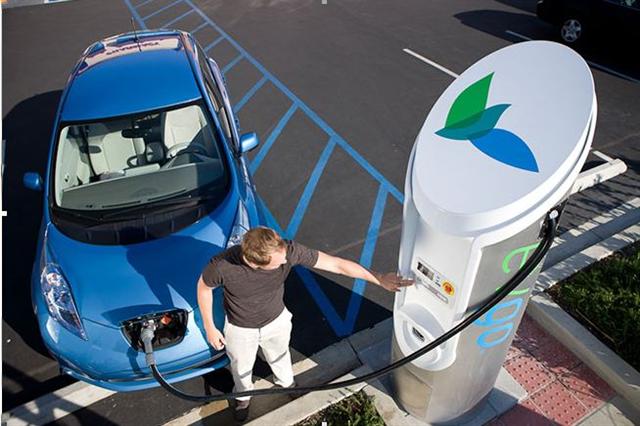These are interesting times in the automotive and electric-utility businesses. While the reasons are different, it turns out they may intersect.
It's been quietly discussed among electric utilities that increasing amounts of distributed solar power and other renewable energy may destroy their business model.
The worry is that if consumers can generate much or all of their own electricity, the utilities lose the revenue from selling them power--while continuing to shoulder the substantial costs of maintaining the electric distribution network as a backup.
MORE: Electric Utilities Now Fighting Home Solar As Threat To Their Business
Meanwhile, while plug-in electric cars on U.S. roads number less than 200,000 today--out of about 250 million vehicles--the miles they travel on grid energy stored in their batteries eliminate the demand for gasoline.
And many electric-car owners turn out to have solar panels on their homes.

2011 Nissan Leaf plugged into an EVgo quick-charging station, Texas
Buying an electric car may even increase interest in clean energy, as owners start to think about "free travel" using electricity from solar panels (aside from the substantial costs of the panels themselves, of course).
Now Tony Seba, an entrepreneur and Stanford University lecturer in continuing studies, is working on a new book in which he predicts that the cost of distributed solar energy will fall so low by around 2030 that it will make electricity from fossil fuels essentially redundant.
Equally radically, he says, plug-in electric cars will do the same to the oil industry--on roughly the same schedule.
Seba argues that the cost of both photovoltaic solar panels and large-scale batteries for energy storage in electric cars will continue to fall, to the point where using them for both energy generation and transportation is significantly cheaper than extracting and transporting carbon-based fuels to be burned.
MORE: How Much And How Fast Will Electric-Car Battery Costs Fall?
Demand for oil as a feedstock for chemical industries is likely to continue, of course, so eliminating the extraction, refining, and transportation of oil and natural gas altogether is unlikely to happen on anything like that schedule.
Still, it's an appealing vision, and the prospect of carbon-free energy and transportation for even some fraction of global demand is likely to be welcomed by anyone who accepts the scientific consensus around climate change caused by man-made carbon emissions.
The working title of Seba's upcoming book is "Disrupting Energy: How Silicon Valley is making coal, nuclear, oil and gas obsolete." It's not yet available for pre-order, but you have to admit it sounds intriguing.
What do you think? Will we see the decline of hydrocarbon-based transportation and the legacy electric-utility industry within your lifetime?
Leave your thoughts in the Comments below.
_______________________________________________












